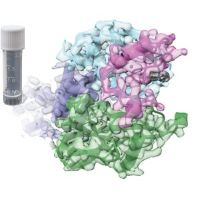Specification
| Description | Recombinant protein from the full-length sequence of Homo sapiens lysine demethylase 8 (KDM8), transcript variant 1 (NM_001145348). |
| Organism | Homo sapiens (Human) |
| Expression Host | Human Cells |
| Tag Info | His or DYKDDDDK. Please contact us if you need further information or require specific designed tag. |
| Purity | Greater than 90% by SDS-PAGE gel |
| Uniprot ID | Q8N371 |
| Entry Name | KDM8_HUMAN |
| Gene Names | KDM8 JMJD5 |
| Alternative Gene Names | JMJD5 |
| Alternative Protein Names | Bifunctional peptidase and arginyl-hydroxylase JMJD5 (EC 1.14.11.73) (EC 3.4.-.-) (JmjC domain-containing protein 5) (Jumonji C domain-containing protein 5) (L-arginine (3R)-hydroxylase KDM8) |
| Application | Antigens, Western, ELISA and other in vitro binding or in vivo functional assays, and protein-protein interaction studies; For research & development use only! |
| Buffer | Purified protein formulated in a sterile solution of PBS buffer, pH7.2, without any preservatives |
| Endotoxin | Endotoxin level is < 0.1 ng/µg of protein (<1EU /µg) |
| Length | 416 |
| Molecular Weight(Da) | 47270 |
| Protein Sequence | (The sequence of expressed protein may have some variation from the sequence shown below. Please contact us for the exact sequence.) MAGDTHCPAEPLAREGTLWEALRALLPHSKEDLKLDLGEKVERSVVTLLQRATELFYEGRRDECLQSSEVILDYSWEKLNTGTWQDVDKDWRRVYAIGCLLKALCLCQAPEDANTVAAALRVCDMGLLMGAAILGDILLKVAAILQTHLPGKRPARGSLPEQPCTKKARADHGLIPDVKLEKTVPRLHRPSLQHFREQFLVPGRPVILKGVADHWPCMQKWSLEYIQEIAGCRTVPVEVGSRYTDEEWSQTLMTVNEFISKYIVNEPRDVGYLAQHQLFDQIPELKQDISIPDYCSLGDGEEEEITINAWFGPQGTISPLHQDPQQNFLVQVMGRKYIRLYSPQESGALYPHDTHLLHNTSQVDVENPDLEKFPKFAKAPFLSCILSPGEILFIPVKYWHYVRALDLSFSVSFWWS |
Background
| Function | FUNCTION: Bifunctional enzyme that acts both as an endopeptidase and 2-oxoglutarate-dependent monoxygenase (PubMed:28847961, PubMed:29459673, PubMed:28982940, PubMed:29563586). Endopeptidase that cleaves histones N-terminal tails at the carboxyl side of methylated arginine or lysine residues, to generate 'tailless nucleosomes', which may trigger transcription elongation (PubMed:28847961, PubMed:29459673, PubMed:28982940). Preferentially recognizes and cleaves monomethylated and dimethylated arginine residues of histones H2, H3 and H4. After initial cleavage, continues to digest histones tails via its aminopeptidase activity (PubMed:28847961, PubMed:29459673). Upon DNA damage, cleaves the N-terminal tail of histone H3 at monomethylated lysine residues, preferably at monomethylated 'Lys-9' (H3K9me1). The histone variant H3F3A is the major target for cleavage (PubMed:28982940). Additionnally, acts as Fe(2+) and 2-oxoglutarate-dependent monoxygenase, catalyzing (R)-stereospecific hydroxylation at C-3 of 'Arg-137' of RPS6 and 'Arg-141' of RCCD1, but the biological significance of this activity remains to be established (PubMed:29563586). Regulates mitosis through different mechanisms: Plays a role in transcriptional repression of satellite repeats, possibly by regulating H3K36 methylation levels in centromeric regions together with RCCD1. Possibly together with RCCD1, is involved in proper mitotic spindle organization and chromosome segregation (PubMed:24981860). Negatively regulates cell cycle repressor CDKN1A/p21, which controls G1/S phase transition (PubMed:24740926). Required for G2/M phase cell cycle progression. Regulates expression of CCNA1/cyclin-A1, leading to cancer cell proliferation (PubMed:20457893). Also, plays a role in regulating alpha-tubulin acetylation and cytoskeletal microtubule stability involved in epithelial to mesenchymal transition (PubMed:28455245). Regulates the circadian gene expression in the liver (By similarity). Represses the transcriptional activator activity of the CLOCK-ARNTL/BMAL1 heterodimer in a catalytically-independent manner (PubMed:30500822). Negatively regulates the protein stability and function of CRY1; required for AMPK-FBXL3-induced CRY1 degradation (PubMed:30500822). {ECO:0000250|UniProtKB:Q9CXT6, ECO:0000269|PubMed:20457893, ECO:0000269|PubMed:24740926, ECO:0000269|PubMed:24981860, ECO:0000269|PubMed:28455245, ECO:0000269|PubMed:28847961, ECO:0000269|PubMed:28982940, ECO:0000269|PubMed:29459673, ECO:0000269|PubMed:29563586, ECO:0000269|PubMed:30500822}. |
| Pathway | |
| Protein Families | |
| Tissue Specificity | Weakly expressed in most cells. Highly expressed in breast cancer cells (PubMed:20457893). Expressed in embryonic stem cells (PubMed:24740926). {ECO:0000269|PubMed:20457893, ECO:0000269|PubMed:24740926}. |
QC Data
| Note | Please contact us for QC Data |
| Product Image (Reference Only) |  |

